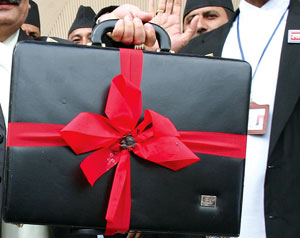 |
An all party meeting called by Maoist Chairman Pushpa Kamal Dahal on Tuesday decided to approve a truncated budget, after the opposition boycotted a similar meeting called by Bhattarai. This has fed speculation that the budget has become a game of ping-pong in the intra-party rivalry between Bhattarai and Dahal.
Despite the agreement on a limited budget, the controversy is far from over. There is still disagreement over whether to bring a partial or a one-third budget and there is strong lobbying going on by the FNCCI (Federation of Nepal Chamber of Commerce and Industry) for a full budget. Even if a limited budget is passed now, constitutional provisions require it to be endorsed by the parliament within six months.
PM Bhattarai it seems has only reluctantly agreed to a partial budget after all-round opposition, including from his own party, forced him to back down. Bhattarai had been firm on his stance on a full budget until recently, and had support from the business community. He even threatened to bring the budget through an ordinance if the other parties did not cooperate.
The Interim Constitution states that a caretaker government cannot bring a full budget and the Supreme Court has also given a verdict along the same lines. Although, the cabinet can propose a full budget through an ordinance, constitutionally the final decision rests with the president.
But President Ram Baran Yadav made it clear last week that he would not consent to this, and directed the PM to bring in budget as per established norms, legal provisions and the SC's verdict. Bhattarai could have defied the president, but the all party meeting hosted by Dahal was the last straw.
Those supporting the full budget say that because the economy is already in a bad shape, anything less than a full budget would further aggravate the slowdown.
The private sector, headed by the FNCCI is taking this line and has been supporting Bhattarai. "It is necessary that a full budget is brought in time to ensure the health of the economy," Rameshore Khanal, former finance secretary and adviser to the prime minister told Nepali Times.
The opposition parties believe the Baburam government has its eyes on the money and wants to use budget allocations to benefit party associates and influence the election. This is not unlikely given past misappropriation of the prime minister's pet project, the Youth Self Employment Fund, which was used to distribute money to Maoist cadres. The Maoists are also accused of siphoning off the resettlement funds for their ex-guerrillas by inflating numbers and doling out money to phantom fighters.
A caretaker government is not supposed to stay in power more than three months and preparing a budget for the full year sends a bad message, critics argue.
Says economic analyst Chandan Sapkota: "Not having a full budget would not significantly dent growth prospects, given the slow pace of the economy. A one-third budget will take care of salaries for government employees, meet our debt obligations, finance elections, and provide partial funding to major ongoing development work." Even the Rs 10 billion requested by the Election Commission can be included.
Having a full budget is also problematic at a time when a dozen government secretaries are retiring en masse. Four secretaries have already retired a month ago and the cabinet has promoted new officals in their place. Those promoted are Durganidhi Sharma, Gyandarshan Udas, Dhan Bahadur Tamang and Surya Prasad Silwal. Looking at the list, the government seems to have made an effort to be more inclusive in its selection.
All other secretaries, except for the one bureaucrat who will get promoted to the post of chief secretary, are to leave office on 30 September, which is why the top post is being fiercely contested. And as usual, the political parties are already lobbying for their candidates, and competition has also started for the soon to be vacant secretarial posts.
Other incumbent secretaries are tight-lipped about their future plans, but the final shortlist for chief secretary is expected to include Umakant Jha and Brinda Hada who are clear favourites because one is a Madhesi and the other is woman and a Janjati close to the PMO. But if the prime minister steps down and the Maoist-Madhesi coalition is replaced by an all-party government, then all bets are off again.
But what worries many in and out of government is the lack of budgetary oversight during the caretaker period with so many efficient and experienced secretaries retiring all at once. The new appointees will be relatively less inexperienced, and bureaucratic turnover can be accompanied by irregularities in budget spending especially if the full budget is passed.
Says Sapkota: "I fear the ministers will waste their budget allocations since there will be so little oversight. The joint secretaries and others below them will pretty much have to agree to what the minister says or else their chances of promotion will go down."
Read also:
Rain check
Show me the money, PAAVAN MATHEMA
And again, political differences are forcing us to settle for a partial budget


